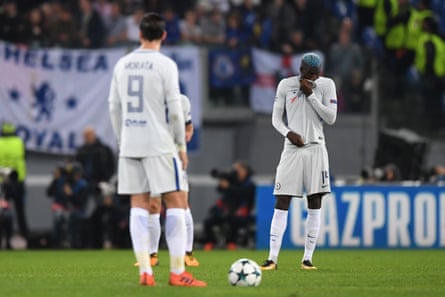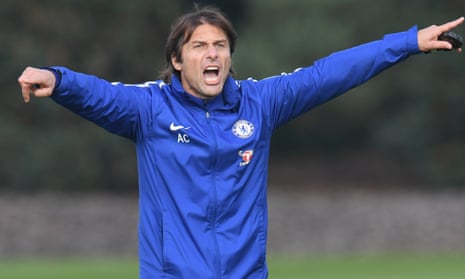Antonio Conte was at his animated best, waving his arms expressively and clicking his fingers as he wrestled for the right words, while the subject matter veered through the need to recover from Rome to the owner’s presence at the training ground via the imminent return of José Mourinho and Nemanja Matic to Stamford Bridge. Yet, once the head coach’s media duties were complete and he could return to his meticulous preparations up in his office, one thing was clear. Chelsea are at a crossroads under Conte.
The gauntlet has been thrown down to his players. If the Italian had initially struggled to make clear just how disgusted he was by Tuesday’s feeble second-half showing at the Stadio Olimpico, for all that his public mutterings had damningly questioned the “hunger” and “desire” of his side, then his feelings were drummed home in the first-team squad’s debrief back at Cobham two days later. Patience had snapped. Those who had let the collective down were singled out, their errors analysed, with the message very much that standards had slipped. From now on in, starting with the awkward yet intriguing visit of Manchester United, repeat offenders will simply be left out. Players will now either respond positively or the title defence will peter out in underachievement. And everyone knows where that particular road tends to lead at Chelsea.
The ins and outs of that meeting were not to be discussed publicly but no one really bought the Italian’s suggestion this was just a bog-standard debrief. Not when his mood was clearly still bristling. “This season we are struggling a lot because we are facing a lot of important problems,” he said on Friday. “And to solve these problems is not simple. But I think, in this moment, you can see if you are winners or losers. You understand? This is very important, this moment. When the period is positive it’s very simple for everyone to play well, to have great confidence. But when you’re struggling it’s important to show character. To be strong. To face the problems in the right way. But I’m used, in my life, to doing this. I have struggled a lot, as a player and then as a coach also. My story tells you this.”
The issue now is how his players react. Conte, to a certain extent, is following a familiar script. Admittedly he had known hardships during his playing days and while he established his reputation as a coach with Arezzo and Siena, Atalanta and Bari. But, while in charge of a dominant Juventus the closest he had come to crisis was in December 2013 when, on a quagmire of a pitch in Istanbul in a rearranged fixture against Galatasaray, the Bianconeri had succumbed to a late Wesley Sneijder goal to go out of the Champions League at the group stage. Real Madrid had always been expected to top the section but Juve’s had been a dismal campaign, at odds with the side’s domestic dominance, with a sense of anticlimax palpable. So having defended his players post-match at the Türk Telekom Arena as if circling the wagons, he duly summoned them to a team meeting at the training base in Vinovo the following day to thrash out the reasons for failure.
Those who attended remember his speech that day lasted over 45 minutes, his message echoed to all intents this week in Cobham. One Juve player present recalls one of the manager’s sound-bites as “never give up because it is only in difficult moments that great sides are born”. Then came the reminder that improvement always begins back on the training pitch. “Every session should be played like it is a final,” said Conte. “Those who give up will be left out.” In adversity every player – however well established – had to prove himself even more. Reputations counted for nothing.
That said, Conte had placed great stock on the core of experienced players within that Juventus team – Gianluigi Buffon, Giorgio Chiellini, Andrea Pirlo and Carlos Tevez – and had listened to their input on team decisions. At Chelsea he had always felt he could lean on players such as David Luiz, César Azpilicueta and Gary Cahill in similar fashion, though it is safe to assume he may not be quite as eager to take on board their suggestions from now on. David Luiz, operating in midfield, had made clear his frustration at being substituted in the 3-3 draw with Roma at Stamford Bridge, which prompted a reminder from the management that such behaviour is as unhelpful as it is unacceptable.

In Italy this week Conte had apparently been willing to accommodate his players’ plea for Cahill to operate on the right of the back three, a move they thought might stabilise the collective rearguard. As it turned out, Chelsea conceded after 38 seconds, were never secure and the captain, crestfallen, was hauled from the fray before the hour-mark. Questions on that tactical move prompted rather cryptic answers on Friday. “Those who must understand [do] understand,” said Conte. “He’s very good playing on the left. We won a league with Cahill in this position. I don’t understand why we have to try again to put him on the right but sometimes can happen a misunderstanding.”
He later added: “I’m a coach who doesn’t like to find excuses or alibis. Sometimes I prefer to put my face [in front of the television cameras] for all the mistakes, even if the mistake is not mine.” From now on there will be no ambiguity and only Conte’s word will prevail but he will expect his senior personnel to react in the right way and set the best example for their team-mates to follow. There had been one heated exchange with Buffon post-Galatasaray, after which the bond between manager and goalkeeper actually felt strengthened. Both David Luiz and Cahill are due to start on Sunday. They have to be the first to demonstrate the “character” the head coach so craves.
History suggests Conte’s crisis management works. Juve had reacted positively, a team stung by criticism who rallied in the months that followed as the dominant side in Serie A. They ended as champions with 102 points, a tally the division had never known. Chelsea, last season, reacted emphatically to successive defeats in September to take on board the head coach’s tactical tweaks and run away with the title. And even in the wake of Tuesday’s humiliation in Rome the team’s predicament does require some context this time round. The champions loiter a point behind Tottenham Hotspur, for whom talk of inconsistent form would feel ludicrous given they conquered Real Madrid in midweek.
Victory on Sunday would even move Chelsea to within a point of Mourinho’s team who, for all the recent talk of stifling tactics, are generally perceived to have made a fine start to the campaign. Moreover, as Conte pointed out, “there is a big problem for all the teams that want to fight for the title and this big problem is Manchester City because, if they continue to play this way, it will be very difficult [for anyone else] to fight for the title”.
Rather, Sunday’s game has become a test of this team’s ability to respond to the Italian. The players have had their commitment and desire challenged, and been told this period will determine whether they are “winners or losers”. There is very little wriggle room after those comments and Conte and Roman Abramovich will know soon enough the team’s true state of mind. “I suffer after a defeat, I suffer,” said the head coach. “I need a bit of time to digest a loss but then, after that time, I start again even stronger, with more hunger, more desire.” His players must show they are of a similar mindset.

Comments (…)
Sign in or create your Guardian account to join the discussion